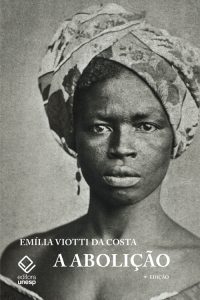The Legacy of Slavery in Brazilian History
Emilia Viotti da Costa points at the need to understand the legacy left behind by slavery

Emília Viotti da Costa is a mandatory reference when it comes to Brazilian History. Her studies revolutionized the understanding of slavery and the struggle of the black people in Brazil, focusing on social sectors that traditionally stood at the margins of Social History. This is clear in The Abolition [A Abolição], where she recounts the abolitionist process that freed the white people from the burden of slavery (Brazil was the last Western country to do it) and abandoned black people to their own fate.
In this book, recently republished by Editora Unesp with an added unpublished chapter, Emília Viotti calls attention to the need to understand the legacy left behind by slavery, since “three hundred years of oppression cannot be eliminated with a signature on a document”. Thus, if the story to be told is the emancipation of the Brazilian people, Abolition should be understood as only the first step. It’s an achievement of limited effect, which is here narrated from a series of questions. “Why was it repudiated in 1888 after centuries of being accepted without objection? Why so much urgency in the project? How to explain most of the parliamentarians, many of which had been elected with the support of slave masters, approved the law without further debate? Why didn’t the slave masters try to prevent, with weapons in hand, the attack on their property guaranteed by the Constitution? What role did the black people and the slaves play in this process? Why did Abolition take so long to be decreed in Brazil? ”
These questions guide the narrative where the story of Abolition is told. They still have repercussions up to this day, when “will, ignorance, violence, misery, and prejudice created by the slave society still burdens on us”. The author argues that “if it is fair to celebrate the Thirteen of May, the celebration cannot blind us to the point of transforming the freedom it symbolizes into a myth at the service of oppression and labor exploitation”.
 About the author – Emilia Viotti da Costa wasborn in São Paulo, graduated from the Faculty of Philosophy, Letters and Human Sciences at University of São Paulo and is a free lecturer in the same university. Forcefully retired in 1969 by the AI-5, she taught at several universities in the United States, including Tulane University and the University of Illinois. She was Full Professor at Yale University from 1973 to 1999. She is the author of From the Monarchy to the Republic; 1932: contradictory interpretation; Crowns of glory, tears of blood; Demerara’s rebellion of slaves in 1823; and The Federal Supreme Court and the construction of citizenship, as well as several articles in specialized magazines. She directed the collection Revolutions of the 20th Century, published by Editora Unesp.
About the author – Emilia Viotti da Costa wasborn in São Paulo, graduated from the Faculty of Philosophy, Letters and Human Sciences at University of São Paulo and is a free lecturer in the same university. Forcefully retired in 1969 by the AI-5, she taught at several universities in the United States, including Tulane University and the University of Illinois. She was Full Professor at Yale University from 1973 to 1999. She is the author of From the Monarchy to the Republic; 1932: contradictory interpretation; Crowns of glory, tears of blood; Demerara’s rebellion of slaves in 1823; and The Federal Supreme Court and the construction of citizenship, as well as several articles in specialized magazines. She directed the collection Revolutions of the 20th Century, published by Editora Unesp.
Title: The Abolition [A Abolição]
Author: Emilia Viotti da Costa
Number of pages: 144
Format: 14 x 21 cm
ISBN: 978-85-7139-832-0
Rights: worldwide free
